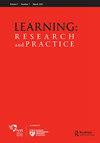Developments in educational neuroscience: implications for the art and science of learning
Q2 Social Sciences
引用次数: 2
Abstract
ABSTRACT Learning is a complex phenomenon where a learner constitutes a system operating at neural, physiological, cognitive and social levels, with interactions between and across processes and levels, effecting neural to cognitive to social levels and vice versa. In tracing historical paradigms, theories of learning have been traditionally fragmented in nature, typically focusing on sub-process or sub–levels of the system. For example, theories of cognitivism focuses on internal processes and connections that take place during learning, negating observed behaviours or outward behaviours of learning, while theories of social constructivism place strong emphasis on human development and knowledge construction that is socially situated, with less attention paid to individual differences and variations. In recognizing inherently complex interrelated learning systems, a more integrated and comprehensive understanding of learning is necessary. Such an understanding entails research endeavours that can harness multiple, complex parameters of the learner system through mapping and understanding interactions between and across learning processes and levels. Such endeavours entail the use of multiple sources of scientific evidence, across multi-modal data capture modes and multi-levels of analyses, informed by multi-disciplinary theoretical framings. In this paper, we argue that an overarching scientific ethos towards learning optimizations need artful implementations of pedagogies and interventions that close the circle—from scientific findings translated into practical applications in education and back to addressing problems in education as impetus for evidence-informed theorizations of learning.教育神经科学的发展:对学习的艺术和科学的启示
学习是一种复杂的现象,学习者构成了一个在神经、生理、认知和社会层面上运行的系统,过程和层次之间存在相互作用,从神经到认知再到社会,反之亦然。在追溯历史范式的过程中,传统的学习理论本质上是碎片化的,通常关注于系统的子过程或子层次。例如,认知主义理论关注学习过程中的内部过程和联系,否定观察到的行为或学习的外部行为,而社会建构主义理论则强调社会情境下的人类发展和知识构建,较少关注个体差异和变异。在认识内在复杂的相互关联的学习系统时,有必要对学习有一个更综合和全面的理解。这样的理解需要研究努力,通过映射和理解学习过程和层次之间和之间的相互作用,可以利用学习者系统的多个复杂参数。这种努力需要使用多种科学证据来源,跨越多模态数据获取模式和多层次分析,并以多学科理论框架为依据。在本文中,我们认为,学习优化的总体科学精神需要巧妙地实施教学法和干预措施,从而闭合循环——从科学发现转化为教育中的实际应用,再到解决教育中的问题,作为循证学习理论的推动力。
本文章由计算机程序翻译,如有差异,请以英文原文为准。
求助全文
约1分钟内获得全文
求助全文

 求助内容:
求助内容: 应助结果提醒方式:
应助结果提醒方式:


